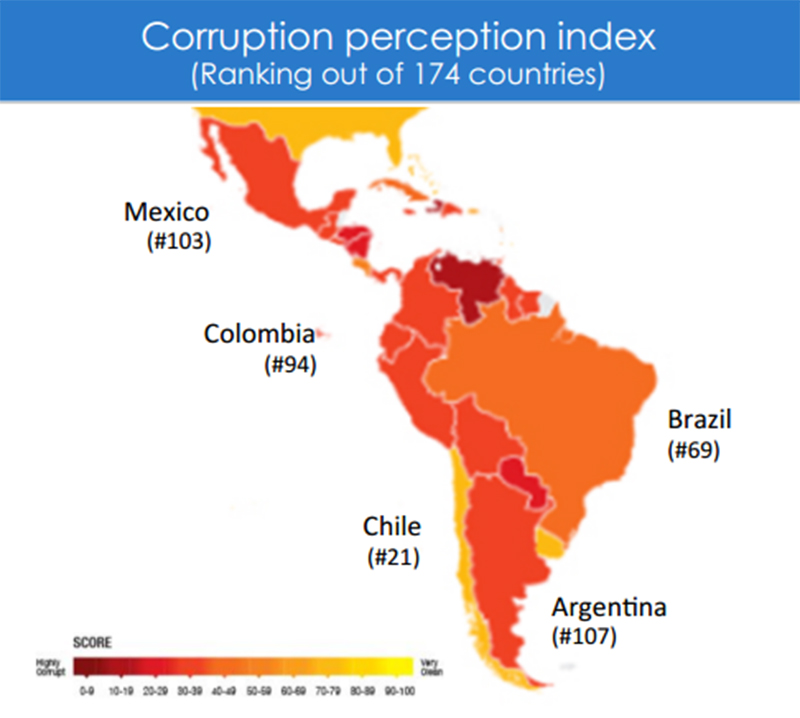Illicit business practices: The burden of corruption on healthcare systems

Unethical business practices have a heavy influence on the healthcare systems of Latin America. Theft, bribery and extortion have led to monetary losses in the billions. According to Transparency International’s 2014 Corruption Perception Index, the extent of the damage is severe enough to classify two-thirds of the region’s 31 countries alongside the world’s most corrupt nations.1 And yet the region can ill afford anything that would further constrain its healthcare system by limiting available resources, lowering the effectiveness and efficiency of services, or lowering quality of overall care. Even though engaging in corruption presents significant risks to companies – with the risk of a tarnished reputation and billion-dollar corporate fines among the most severe, unethical behavior will continue to play a role in Latin America.
“I have yet to hear of one country in Latin America that does not have an issue with the role of corruption.”
Leading medical device manufacturer
Much of the corruption stems from political figures and unethical behavior in the public sector. The prevalence of state-owned or state-controlled healthcare institutions have led to compliance challenges regarding anti-bribery laws.
- In Mexico, kickbacks on government contracts can reach 25% to 30% of project value in the form of cash and other material goods such as computers, cars, land, constructions, homes and political favors.
- In Honduras, the vice-president of Congress, Lena Gutierrez, and some of her family have been charged with fraud, crimes against public health and falsification of documents. They are suspected of having links to a company that allegedly embezzled the state by selling poor-quality medicine at inflated prices.2
- In Guatemala, political corruption in the health system has directly led to loss of lives. Authorities arrested 17 people, including the head of the Guatemalan Central bank, in an ongoing investigation into fraud at the Instituto Guatemalteco de Seguridad Social (IGSS). The scandal reveals that IGSS employees and the head of the Bank of Guatemala stood to make 15% in kickbacks. These persons have been charged with fraud, bribery, conspiracy, influence peddling, illegal collection of fees, illicit association and insider trading. Charges of culpable homicide could be filed as the scandal resulted in the deaths of at least five kidney-failure patients.3
Corruption goes beyond bribes and kickbacks. There are cases of individuals and entities often billing the government for services that were never rendered or even selling expired medications in altered packages.4 In Ecuador, such behavior has become a major issue for the healthcare system. Guayaquil’s Teodoro Maldonado Carbo Hospital
 Source: Transparency International
Source: Transparency International
has been one such source of corruption where dozens of tunnels have been used to smuggle medicines out of the hospital for illicit sale.5
Even Brazil’s image has been stained by corruption as the Petrobras scandal comes to light, involving both public and private individuals in a multi-million dollar affair that appears to lead as high as the Presidential Office.
Impunity at the top enables corruption to flourish. As new leaders take office, they have an opportunity to change long-established practices. They must look towards anti-corruption initiatives to reduce the impact of unethical behavior in the region. The priority for improving healthcare management systems is to increase transparency. There is an opportunity for international agencies and civil society to come together in the fight against these unethical practices.
- One such example is The World Bank, which assists countries in appointing high profile committees to investigate the scale and scope of corruption in their societies, to set priorities for anti-corruption activities, and to develop and implement action plans.3 These action plans are only effective when they receive high-level political assistance and involve the public and media by opening channels for participation.
- Organizations such as Transparency International can empower citizens to take action and hold politicians accountable for unethical government acts. Activities such as holding regional workshops have helped equip concerned citizens with new ways to combat corruption such as survey instruments and citizen initiatives.3
Transparency and accountability must increase if the role of corruption is to diminish.
www.globalhealthintelligence.com 5




